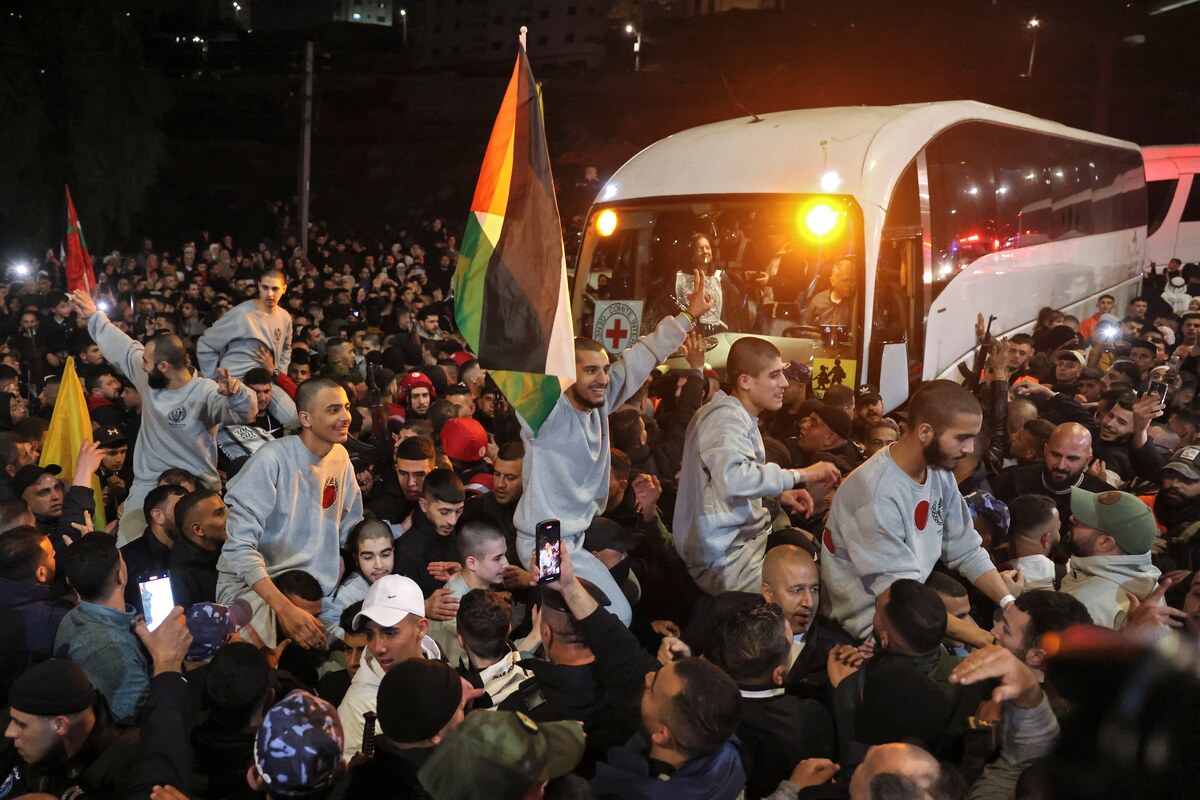BEIRUT: Lebanese President Joseph Aoun hoped on Thursday “for the ceasefire in Gaza to end the tragic reality and prompt Israel to seriously abide by the clauses of the agreement, which requires the follow-up of the sponsoring states and the UN.”
Israel had always evaded its commitments and ignored international resolutions, he said.
“The hostilities taking place in the south (of Lebanon), as well as the violations of the ceasefire agreement, prove so.”
Aoun’s comments came as Israel’s violations of Lebanese airspace reached Beirut and its forces continued to bulldoze the neighborhoods of Taybeh and Aita Al-Shaab.
Lebanese Broadcasting Corporation International said its media staff “came under Israeli fire while accompanying an ambulance team inside a house in Mays Al-Jabal, with no casualties reported.”
Aoun, who was elected president a week ago, received invitations to visit Qatar and Jordan. He also took a phone call from Saudi Crown Prince Mohammed bin Salman, who invited him to visit the Kingdom. Aoun said it would be his “first visit abroad.”
Qatar’s Ambassador to Lebanon Saud bin Abdulrahman Al-Thani delivered an official invitation from his nation’s leader, Sheikh Tamim bin Hamad Al-Thani, for Aoun to visit Doha.
In the letter, the sheikh said he hoped that Aoun’s tenure would “witness a new stage where security, stability and prosperity will prevail in the country.”
In a speech delivered from the presidential palace, the ambassador expressed his country’s “continuous support for Lebanon in all the political, economic and military fields.”
Jordan’s Foreign Minister Ayman Safadi delivered an invitation from King Abdullah II for Aoun to visit Jordan. He also expressed Jordan’s “commitment to supporting Lebanon, its security, stability and full sovereignty” and urged Israel to “honor the ceasefire agreement and stop its violations against Lebanon.”
Safadi also met Parliament Speaker Nabih Berri and Prime Minister-designate Nawaf Salam.
“We believe that the new leadership in Lebanon can go forward and we affirm that we will continue to support the Lebanese army,” he said.
“We look with our partners worldwide into providing what the army needs in terms of fundamental capabilities so it could carry out its role.”
Safadi said that the mediators announced the ceasefire in the Gaza Strip “clearly and decisively” and that “the whole world knows the importance of respecting and implementing this agreement.”
“We call for full compliance,” he said. “We also urge the opening of all crossings and an international effort to deliver sufficient humanitarian aid to Gaza.”
French President Emmanuel Macron is scheduled to make a working visit to Beirut on Friday, becoming the second head of state to visit the country, following Cyprus’ President Nikos Christodoulides.
UN Secretary-General Antonio Guterres is also expected to travel to Beirut to congratulate Aoun.
The Elysee Palace said Macron’s visit “underscores France’s unwavering commitment to Lebanon’s stability, unity and development” and that his presence would strengthen the ceasefire monitoring mechanisms, mainly focusing on UNIFIL’s peacekeeping operations.
In domestic developments, Aoun held talks with acting Central Bank Governor Wassim Mansouri, who offered his first public assessment since Lebanon’s recent period of turmoil.
He reported “improving monetary conditions and increased foreign currency reserves following the presidential election” and emphasized the central bank’s policy of maintaining the value of the Lebanese pound “without market intervention.”
Earlier on Wednesday, Aoun received Spain’s Minister of Foreign Affairs, EU and Cooperation Jose Manuel Albares Bueno.
Meanwhile, Salam entered the final day of non-binding parliamentary consultations regarding government formation and the ministerial statement that will outline his administration’s agenda.
The process has unfolded amid growing international and Arab support for Lebanon’s new leadership.
A meeting between Salam and Berri is expected to take place on Friday.
Both Berri’s parliamentary bloc and Hezbollah’s representatives have boycotted the consultations, protesting against Salam’s appointment ahead of their preferred candidate, Najib Mikati.
If it takes place, the meeting between Berri and Salam is intended to ease Hezbollah’s concerns.
It will also seek to assure the party it has not lost its internal cohesion following the speeches of the president and prime minister.
Salam is expected to present his vision for forming the next government to Berri and the president after consulting with all parliamentary blocs, including independent and Change lawmakers.
MP Jihad Al-Samad met Salam on Thursday and quoted him as saying that “given the ongoing disagreement, there are only two solutions: either an agreement or an agreement.”
Other lawmakers who attended the talks said the parliamentary consultations concluded on the second day with the “assertation that the government’s ministerial statement must be a reflection of the president’s oath speech.”
They said the consultations also emphasized the importance of “establishing a government capable of protecting Lebanon, overseeing rapid reconstruction and ensuring the return of the displaced people to the south.”
“It must be a government composed of qualified people, free from political calculations, with all its components, including new faces who aspire to trust and plan to restore depositors’ funds,” they said.
“Additionally, the government should consist of national competencies, separate parliamentary seats from ministerial posts and ensure the transparency and integrity of the judiciary to attract investments back to the country.”
At the end of the first day of the parliamentary consultations, the parliamentary blocs expressed their desire to form “a government of specialists representing all the parliamentary blocs.”
Lebanese president seeks Israel’s commitment to Gaza deal, warns against violations
https://arab.news/vgmwj
Lebanese president seeks Israel’s commitment to Gaza deal, warns against violations

- French president, UN chief set to visit Beirut as Aoun rallies support
- PM-designate Salam calls for dialogue with Hezbollah, Amal as consultations end




























